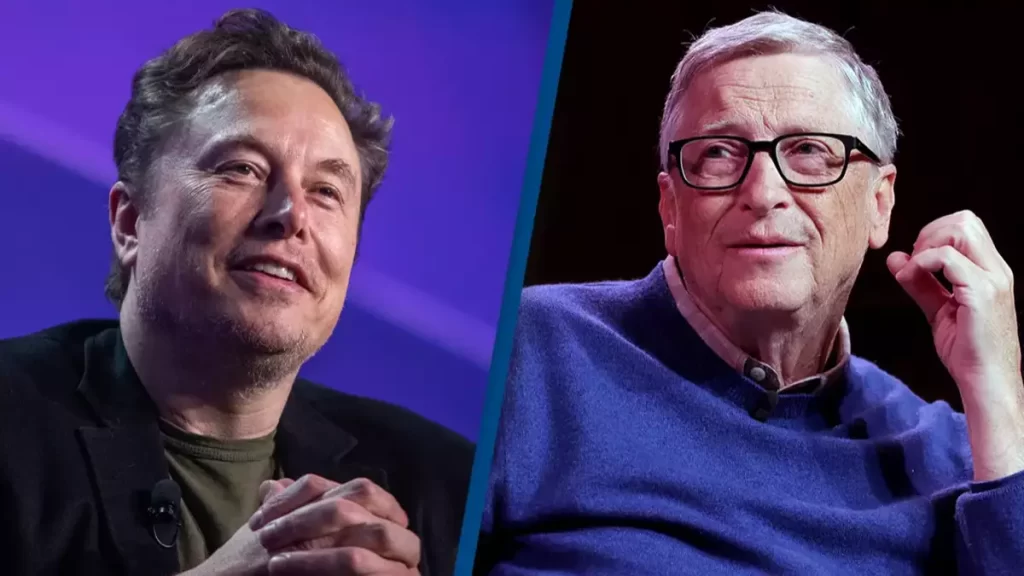Tesla CEO Elon Musk, the world’s richest man with a staggering net worth exceeding $400 billion, has once again sparked a fiery debate on social media. Known for his outspoken personality and knack for controversial remarks, Musk took a jab at Microsoft co-founder Bill Gates, suggesting that Gates could face financial turmoil if Tesla overtakes Apple to become the world’s most valuable company. This comment, posted on X (formerly Twitter), reignites a long-standing rivalry between the two tech titans.

In this article, we’ll explore the context of Musk’s bold statement, the history of his feud with Gates, and the implications of Tesla’s growing market valuation.
The Genesis of Musk vs. Gates Feud
Gates’ Alleged Short Position on Tesla Stock
The animosity between Musk and Gates has been brewing for years, largely fueled by Gates’ rumored short position against Tesla stock. A short position means betting on the decline of a company’s stock value, and Musk has publicly criticized Gates for this move. According to Musk, Gates’ actions reflect a lack of faith in Tesla’s mission to accelerate the world’s transition to sustainable energy.
Musk’s latest comment seems to be a continuation of this dispute. By suggesting that Gates could go bankrupt if Tesla surpasses Apple in market valuation, Musk highlights the massive stakes tied to Tesla’s success.
A Battle of Ideologies
While Gates has focused his post-Microsoft career on philanthropy through the Bill & Melinda Gates Foundation, Musk has been pushing boundaries in technology and space exploration. Their differing approaches to tackling global challenges have often put them at odds. Gates has expressed skepticism about certain Tesla initiatives, while Musk has criticized Gates for being less ambitious in addressing climate change.
Tesla’s Meteoric Rise in Market Value
Current Market Position
Tesla’s market valuation currently stands at over $800 billion, making it one of the most valuable companies in the world. While Apple holds the crown as the most valuable company with a valuation exceeding $3 trillion, Tesla’s growth trajectory suggests it could close the gap in the coming years.
Factors Driving Tesla’s Growth
Tesla’s success can be attributed to several key factors:
- Innovation in Electric Vehicles (EVs): Tesla’s dominance in the EV market continues to expand, with models like the Model 3, Model Y, and Cybertruck drawing widespread consumer interest.
- Advancements in Battery Technology: Tesla’s focus on improving battery efficiency and reducing costs gives it a significant edge in the EV market.
- Expansion into Energy Solutions: Beyond cars, Tesla’s ventures into solar energy and energy storage systems contribute to its diversified revenue streams.
- Strong Brand Loyalty: Tesla’s brand is synonymous with innovation, attracting a loyal customer base and driving up its stock value.
Implications of Tesla Surpassing Apple
A Paradigm Shift in Tech Leadership
If Tesla overtakes Apple, it would signify a major shift in the tech industry. Apple’s dominance has been built on its ecosystem of products and services, while Tesla represents the future of clean energy and transportation. Such a milestone would validate Musk’s vision and reinforce Tesla’s role as a leader in global innovation.
Financial Ramifications for Gates
Musk’s assertion that Gates could face financial trouble hinges on Gates’ alleged short position on Tesla. If Tesla’s stock continues to rise, short sellers like Gates would incur significant losses. While it’s unlikely that Gates—with a net worth of over $100 billion—would face bankruptcy, Musk’s remark underscores the high stakes involved in betting against Tesla.
The Broader Context: Tech Rivalries and Personalities
Musk’s Social Media Presence
Elon Musk’s penchant for stirring controversy on social media is well-documented. His comments often blur the line between personal grievances and professional disputes, capturing the attention of millions. By calling out Gates, Musk not only reignites a personal feud but also reinforces his position as a vocal advocate for Tesla.
Gates’ Philanthropic Focus
In contrast, Bill Gates has largely steered clear of public spats, focusing instead on philanthropic endeavors like combating infectious diseases and promoting renewable energy. However, his alleged financial decisions regarding Tesla stock have placed him in Musk’s crosshairs.
What Lies Ahead for Tesla and Musk?
Challenges on the Road to $3 Trillion
While Tesla’s growth is impressive, achieving a $3 trillion market valuation is no small feat. Challenges include:
- Regulatory Hurdles: Governments worldwide are tightening regulations on autonomous driving and EV production.
- Increased Competition: Legacy automakers like Ford and General Motors, along with new entrants like Rivian, are vying for market share.
- Economic Uncertainty: Global economic conditions could impact consumer spending on high-priced EVs.
Musk’s Vision
Despite these challenges, Musk remains optimistic. His ambitious plans for Tesla—including expanding production capacity, launching new models, and investing in AI-driven technologies—underscore his belief in the company’s potential to redefine the tech landscape.
FAQs
1. Why does Elon Musk criticize Bill Gates?
Elon Musk criticizes Bill Gates primarily because of Gates’ alleged short position against Tesla stock. Musk views this as a lack of support for Tesla’s mission to promote sustainable energy.
2. Can Tesla really surpass Apple in market valuation?
While it’s a challenging goal, Tesla’s rapid growth, driven by innovations in EVs and clean energy, makes it a possibility in the long term.
3. What is Tesla’s current market valuation?
As of now, Tesla’s market valuation is over $800 billion, making it one of the most valuable companies globally.
4. How has Tesla impacted the automotive industry?
Tesla has revolutionized the automotive industry by popularizing electric vehicles, advancing battery technology, and promoting sustainability.
5. What are the risks of betting against Tesla stock?
Betting against Tesla stock can be risky due to its volatile nature and strong brand loyalty. Short sellers face significant financial losses if the stock price rises.




